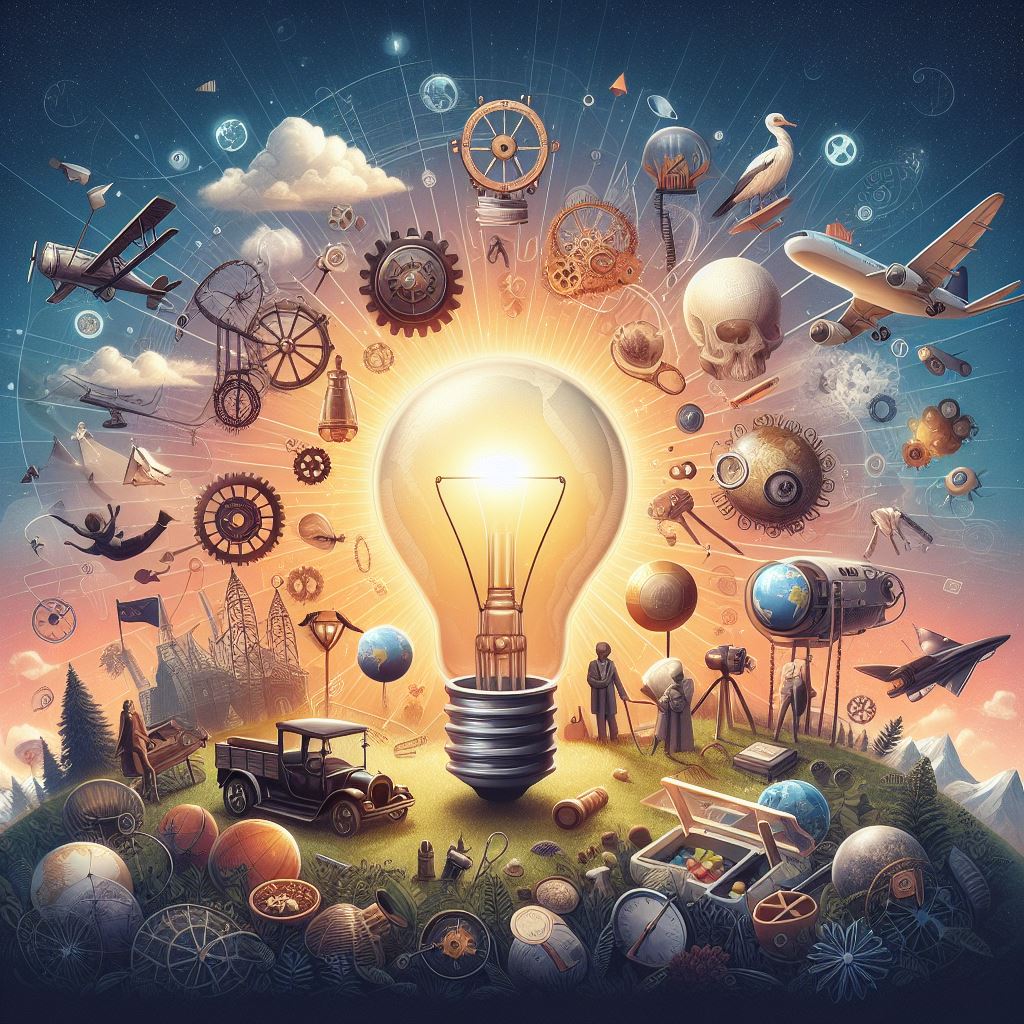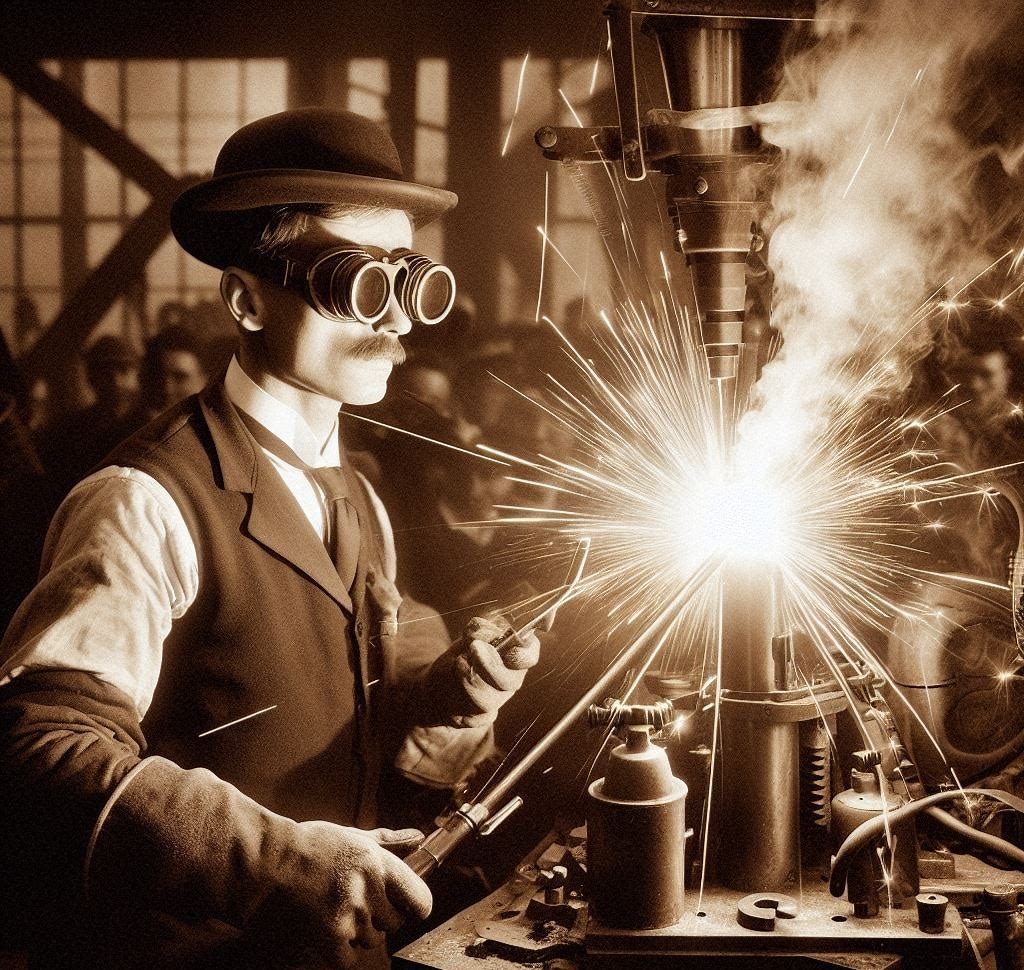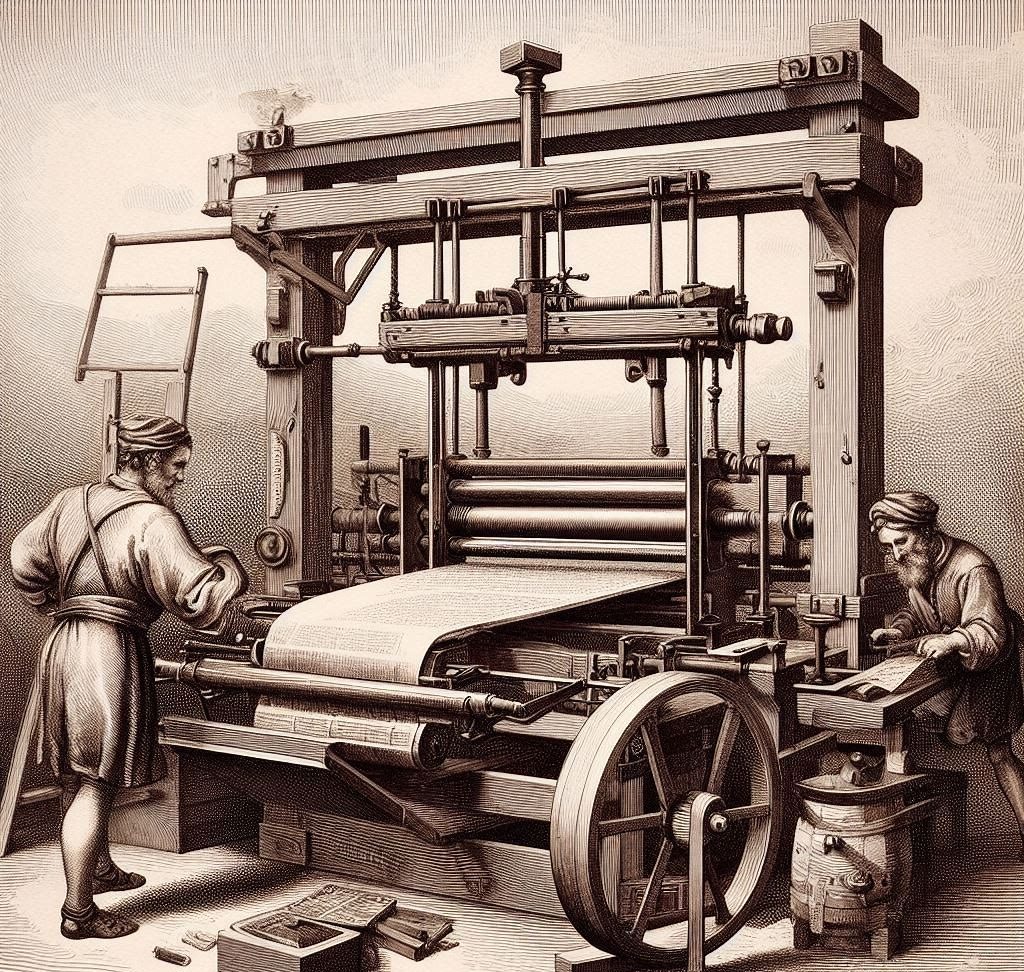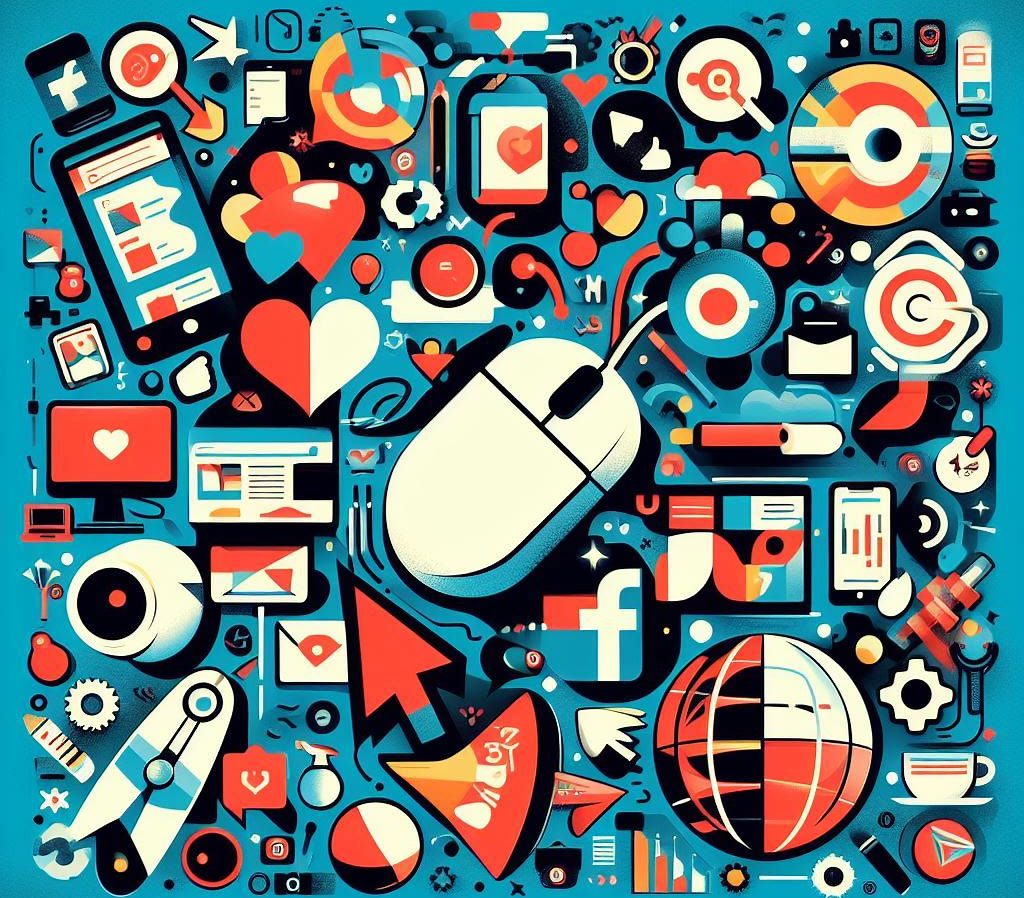“From the invention of the wheel 5,500 years ago to the revolutionary impact of the artificial intelligence, these 10 innovations have significantly influenced human history, profoundly shaping the fabric of our world.”
Throughout history, human ingenuity and creativity have driven the creation of numerous inventions, reflecting our innate desire to solve problems, enhance quality of life, and venture into the unknown. These innovations have profoundly impacted the world, altering the ways in which we communicate, travel, work, learn, and entertain ourselves. From life-saving medical advancements to groundbreaking technological breakthroughs, humanity’s curiosity and inventive spirit have continuously propelled us forward.
Thomas Edison’s resilience and determination exemplify the spirit of progress, where each attempt, whether successful or not, contributes to the journey of innovation. As Carla Hayden, the U.S. librarian of Congress, aptly observes, the pursuit of progress is marked by both incremental improvements and occasional transformative leaps.
Ranking innovations is a nuanced endeavor, blending elements of art and science. How does one compare the impact of a camera to that of an airplane? Yet, what remains undeniable is the cumulative effect of progress, where each advancement builds upon the foundation laid by its predecessors. While some inventions owe their existence to singular moments of insight, many are the result of collaborative efforts and iterative improvements over time. The printing press, for example, catalyzed a cascade of innovation by enabling the widespread dissemination of knowledge and ideas. Literacy flourished, thinkers shared insights, and new inventions emerged, propelling society forward in an ever-expanding cycle of progress. While modern innovations often focus on refinement rather than revolution, there are still moments of dramatic breakthroughs, such as 3-D printing or the Internet. These advancements redefine the possibilities of human ingenuity, reshaping the way we live, work, and interact with the world around us.
In this article, we delve into the stories behind 10 of the most influential inventions in human history, examining the scientific principles that underpin them and the evolutionary paths that led to their creation. Let’s explore a selection of pivotal human inventions that have revolutionized the world.
1. Wheel:
The invention of the wheel stands as one of humanity’s most foundational achievements, marking a pivotal moment in our ability to manipulate and harness the forces of nature. Originating around 3500 B.C., this ingenious creation fundamentally transformed human existence by revolutionizing transportation and commerce.
Before the advent of the wheel, our capacity to transport goods over land was severely limited, constraining both the scale of agricultural endeavors and the reach of trade networks. With the introduction of the wheel, however, a new era dawned, characterized by unprecedented mobility and connectivity.
The wheel’s impact on agriculture cannot be overstated. By facilitating the movement of heavy loads, such as crops and equipment, it revolutionized farming practices, allowing for larger-scale cultivation and more efficient harvesting. This, in turn, fueled population growth and societal development.
Moreover, the wheel’s role in commerce cannot be overlooked. It enabled the establishment of trade routes spanning vast distances, connecting distant communities and facilitating the exchange of goods and ideas. From the Silk Road of antiquity to the modern highways and railways that crisscross the globe, the wheel has been a driving force behind economic prosperity and cultural exchange.
Beyond its practical applications, the wheel has also left an indelible mark on human culture and technology. Its ubiquity is evident in the myriad forms it takes, from the humble potter’s wheel to the intricate gears of a clock tower. Furthermore, the wheel serves as a symbol of innovation and progress, reminding us of humanity’s enduring quest to transcend limitations and shape our destiny.
In sum, the invention of the wheel represents a triumph of human ingenuity, unlocking new possibilities and reshaping the world in ways both profound and enduring. Its legacy endures in every aspect of modern life, serving as a testament to the transformative power of invention.
2. Nails:
The invention of nails marks a significant milestone in human history, with origins dating back over 2,000 years to the Ancient Roman era. This pivotal development was made possible by advancements in metalworking techniques, which allowed for the casting and shaping of metals with precision.
The introduction of nail-making machines in the late 18th and early 19th centuries revolutionized the production process, dramatically increasing efficiency and output. As technology continued to evolve, innovations in nail crafting further refined the manufacturing process, leading to the creation of nails that were stronger, more durable, and versatile in their applications.
Nails played a crucial role in various aspects of human civilization, from construction and woodworking to shipbuilding and infrastructure development. Their widespread use facilitated the construction of sturdy and resilient structures, laying the foundation for urbanization and architectural innovation.
Moreover, the invention of nails spurred advancements in other fields, such as navigation. While seemingly unrelated, the development of the compass was intricately linked to the expansion of trade and exploration enabled by sturdy ships constructed using nails. By providing sailors with a reliable means of determining direction, the compass revolutionized maritime navigation, opening up new horizons and shaping the course of history.
In essence, the invention of nails represents a testament to human ingenuity and resourcefulness, underscoring our ability to transform raw materials into tools that have far-reaching implications for society. Whether holding together the framework of a building or guiding a ship across uncharted waters, nails have left an indelible mark on human progress and continue to be indispensable in shaping the world we inhabit.
3. Compass:
In antiquity, mariners relied on celestial navigation, using the stars to guide their voyages across the seas. However, this method proved ineffective during daylight hours or under overcast skies, limiting the scope of maritime exploration and posing significant risks to sailors venturing far from shore.
The breakthrough came with the invention of the compass, a pivotal advancement attributed to the Chinese during the 9th to 11th centuries. Crafted from lodestone, a naturally magnetized iron ore, the compass harnessed the inherent magnetic properties that the Chinese had been studying for centuries. This innovative tool quickly disseminated to European and Arab seafarers through maritime trade routes, transforming navigation on a global scale.
With the compass in hand, mariners gained the ability to navigate reliably regardless of the time of day or weather conditions, empowering them to venture safely into the open ocean. This newfound confidence spurred a surge in sea trade and exploration, fueling the era known as the Age of Discovery.
The compass not only facilitated the expansion of trade routes but also played a pivotal role in unlocking new frontiers and connecting distant civilizations. Its impact reverberated throughout history, shaping the course of exploration, commerce, and cultural exchange for centuries to come.
4. Electric Welding:
Elihu Thomson’s electric welding process stands as a hallmark of innovation in the era of mass production. By harnessing electricity to join metals, this groundbreaking technique revolutionized manufacturing, facilitating faster production and the construction of superior, more intricate machines.
In an age driven by industrialization and the quest for efficiency, Thomson’s electric welding process offered a transformative solution. By providing a reliable and efficient method for welding metals, it enabled manufacturers to streamline their production processes and meet the growing demands of the market.
Moreover, the electric welding process opened up new possibilities for engineering and design, allowing for the creation of more complex and precisely crafted machines. This advancement not only enhanced the quality of manufactured goods but also accelerated technological progress across various industries.
In essence, Thomson’s electric welding process exemplifies the power of innovation to drive progress and propel society forward. Its impact reverberates through the annals of manufacturing history, leaving an enduring legacy of efficiency, precision, and advancement.
5. Printing Press:
The printing press, a marvel of scientific ingenuity, stands as a cornerstone of human progress. Invented by the German innovator Johannes Gutenberg circa 1440, this revolutionary device forever altered the landscape of communication and knowledge dissemination.
Prior to the printing press, the laborious process of hand-copying manuscripts limited the production and distribution of books, making knowledge a scarce and often exclusive commodity. However, with the advent of Gutenberg’s printing press, the speed and efficiency of book reproduction underwent a seismic shift. Suddenly, the once arduous task of copying texts by hand was replaced by a mechanized process capable of producing multiple copies with unprecedented speed and precision.
This transformation in book production catalyzed a paradigm shift in human society, democratizing access to knowledge on an unprecedented scale. For the first time in history, ideas could be disseminated widely and rapidly, transcending geographical and social barriers. The printing press became a catalyst for intellectual flourishing, fueling the Renaissance and paving the way for the Enlightenment.
Moreover, the printing press facilitated the standardization of language, the spread of literacy, and the rise of scientific inquiry and cultural exchange. It laid the foundation for the modern publishing industry and fundamentally reshaped the way information is shared and consumed.
In sum, Gutenberg’s printing press heralded a new era of enlightenment and empowerment, empowering individuals with the tools to access, share, and engage with the vast reservoirs of human knowledge. Its impact reverberates through the corridors of history, underscoring the transformative power of invention in shaping the trajectory of human civilization.
6. Light Bulb:
The invention of the light bulb stands as a monumental achievement in the annals of technological progress, heralding a transformative era in human history. Revolutionizing the way we illuminate our homes, workplaces, and streets, the light bulb ushered in a new era of convenience, productivity, and connectivity.
While the light bulb is often attributed to the genius of Thomas Edison, its development was a collaborative effort spanning decades and involving numerous scientists and engineers. Early attempts to create artificial light, such as those by Alessandro Volta, laid the groundwork for subsequent innovations, even though their results were initially dim and short-lived.
However, it was Edison who achieved the breakthrough that would change the world. In 1879, he patented the first successful incandescent light bulb, marking a pivotal moment in human history. Edison’s invention not only illuminated our surroundings but also paved the way for new forms of entertainment, communication, and industry.
The widespread adoption of the light bulb revolutionized daily life, enabling longer working hours, safer nighttime activities, and greater social interaction. It catalyzed advancements in urban planning, architecture, and public safety, while also fueling the growth of industries reliant on artificial lighting.
In essence, the invention of the light bulb represents a triumph of human ingenuity and collaboration, demonstrating the power of persistence and innovation to reshape the world. Its legacy endures as a beacon of progress, illuminating our path forward into a brighter future.
7. Internal Combustion Engine:
The internal combustion engine stands as one of the most transformative inventions in human history, reshaping the world in profound ways. Originating in ancient China between the 10th and 13th centuries, the concept of internal combustion engines first emerged in the form of rocket engines. However, it wasn’t until 1698 that the first steam engine was designed, laying the groundwork for subsequent developments.
Samuel Brown’s patent of the internal combustion engine in 1823 marked a significant milestone, as it paved the way for its industrial application. This invention revolutionized transportation, facilitating the development of modern vehicles such as cars, trucks, buses, motorcycles, trains, airplanes, and ships. Travel became faster, easier, and more accessible for both people and goods, fueling economic growth and globalization.
Moreover, the internal combustion engine played a pivotal role in driving industrialization and boosting the economy. By providing a powerful and efficient source of energy for factories, machines, and tools, it catalyzed productivity and innovation. The automotive industry flourished, creating new markets and jobs in vehicle production, maintenance, and fuel trade.
In essence, the internal combustion engine’s impact extends far beyond mere transportation, shaping the fabric of modern society and propelling humanity into an era of unprecedented mobility and economic prosperity. Its legacy endures as a testament to the power of innovation to transform the world.
8. Telephone:
Communication has always been a fundamental aspect of human existence, shaping societies and facilitating connections across vast distances. In the past, the exchange of messages relied on laborious methods such as letters, telegrams, or messengers, often resulting in prolonged waits spanning days or even months for correspondence.
However, the landscape of communication underwent a seismic shift with the advent of the telephone. In 1876, Alexander Graham Bell secured the patent for this groundbreaking invention, forever altering the way humans interacted across distances. The invention of the electromagnetic telephone facilitated instantaneous communication, transcending geographical barriers and bringing people closer together than ever before.
The impact of the telephone extended far beyond mere convenience, revolutionizing communication on personal, business, and societal levels. By enabling real-time dialogue regardless of distance, it facilitated the exchange of ideas, information, and emotions with unprecedented speed and efficiency. This transformative innovation not only enhanced interpersonal relationships but also catalyzed advancements in commerce, industry, and social cohesion.
Moreover, the telephone served as a catalyst for further technological development, laying the groundwork for subsequent innovations in telecommunications and beyond. Its legacy endures as a testament to the power of human ingenuity to overcome barriers and forge connections that transcend time and space.
In essence, the invention of the telephone represents a pivotal moment in the evolution of communication, ushering in an era of connectivity and accessibility that continues to shape the fabric of modern society.
9. Internet:
Undoubtedly, while the telephone marked a monumental shift in communication, the invention of the internet stands as one of the most profound events in human history, forever altering the way we connect, communicate, and exchange information.
Transforming the world into a global village, the internet has transcended geographical boundaries, bridging continents and cultures with the click of a button. Its emergence has not only revolutionized commerce on a global scale but has also catalyzed the development of new technologies and innovations, driving unprecedented progress and connectivity.
More than just a tool for communication, the internet has become a catalyst for collaboration, fostering synergy and creativity among individuals from diverse backgrounds and disciplines. It has democratized access to information, empowering people to learn, share, and innovate on a scale never before imagined.
Today, the internet permeates every aspect of modern life, from education and healthcare to entertainment and social interaction. Its absence would indeed disrupt the fabric of society, underscoring its indispensable role in shaping contemporary existence.
In essence, the internet represents the culmination of human ingenuity and the collective quest for knowledge and connectivity. Its impact reverberates through every corner of the globe, forever changing the way we live, work, and interact with one another. Truly, the internet has transformed the world in ways that were once unimaginable, heralding a new era of boundless possibility and interconnectedness.
10. Artificial Intelligence
Last but not the least, we come to the invention of Artificial Intelligence (AI), a groundbreaking development that has profoundly reshaped every facet of human existence. AI, a field within computer science, seeks to create machines and systems capable of emulating human intelligence, encompassing tasks such as reasoning, learning, decision-making, and problem-solving.
The journey of AI spans a rich and multifaceted history, from its philosophical roots to its modern-day applications and challenges. What began as abstract theoretical concepts has evolved into a tangible force driving innovation and transformation across industries and disciplines.
The impact of AI extends far beyond mere communication and information exchange. By unlocking the potential for machines to think and learn autonomously, AI has paved the way for a new era of technological advancement and discovery. It has facilitated the development of new technologies and innovations, pushing the boundaries of what was once thought possible.
Moreover, AI serves as a catalyst for collaboration, bringing together individuals from diverse backgrounds, disciplines, and locations in pursuit of common goals. Its capacity for experimentation and problem-solving transcends conventional limitations, fostering a culture of creativity and innovation that fuels progress and discovery.
In essence, the invention of Artificial Intelligence represents a watershed moment in human history, heralding a future where the boundaries between human and machine blur, and the possibilities for advancement are limitless. As we continue to navigate the ever-evolving landscape of AI, one thing remains certain: its impact on society and civilization will continue to reverberate for generations to come.
Read Also:
- Human Inventions Move The Societies Backward
- Video Games That Changed the Industry Forever
- The Mushroom Revolution That’s Bringing Change
📍 SEO & Content Strategist | Expert in Current Affairs, History, Geography & Education Blogs | Digital Marketing Specialist
Muhammad Talha Mehmood is a seasoned digital marketing specialist, SEO expert, and content strategist with over six years of experience in creating high-impact, research-driven content. As the driving force behind Globaleak.com, he delivers in-depth articles on current affairs, history, geography, and education, helping readers stay informed with accurate, well-researched insights.
🔹 Expertise & Achievements:
✔ SEO & Content Strategy: Specializes in creating authoritative, high-ranking content that aligns with Google’s EEAT guidelines.
✔ Research & Analysis: Covers historical events, geopolitical trends, and educational topics with in-depth research and expert insights.
✔ Proven Track Record: Has successfully worked with global clients, delivering content that enhances brand trust, audience engagement, and search rankings.
✔ Academic Excellence: Holds an MBA in Marketing from IBA, University of the Punjab, and a B.Com (Hons) from Hailey College of Commerce.
✔ Industry Experience: Started his career with Packages Limited, trained under PITB’s E-Rozgar Program, and later became a Team Leader & Trainer at Emenac Group of Companies.
🚀 Passionate about creating impactful content, Muhammad Talha ensures every article is insightful, engaging, and value-driven.
📧 Email: talhamehmood34@gmail.com
🔗 LinkedIn: linkedin.com/in/talhamehmood-34













